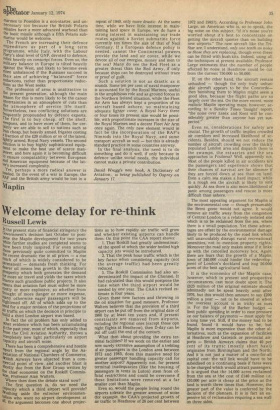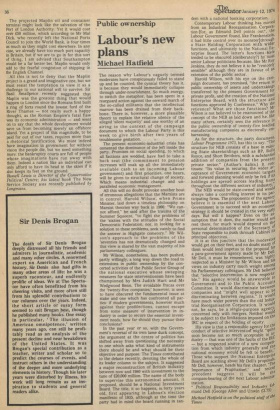Maplin
Welcome delay for re-think
Russell Lewis
In the present state of financial stringency the Covernment's decision last October to postP°rie the Maplin development for two years rile further studies are completed seems to ,uave been truly inspired. For even among `Hose previously quite committed to Maplin the recent dramatic rise in oil prices — a rise much of which is widely considered to be Permanent — demands fresh thinking. For dearer oil means less growth in the nation's frosperity which both generates the demand Lcir more air travel and yields the taxes which `inance such grandiose public projects. it also beans that aviation fuel must either be more Iostly or more explosive, so whether from .„.._11ought of more danger or more expense, any otherwise eager passengers will be urightened off. All of which adds up to the tleed. for a major revision of the projections of ialir traffic on which the decision in principle to Wid a third London airport was based. In fact the oil problem has only added to 9.her evidence which has been accumulating in the past year, most of which, especially that mm the Civil Aviation Authority, throws a completely new light particularly on. airport capacity and aircraft noise. There has been a comprehensive and hostile report from the regional angle by the As elation of National Chambers of Commerce, °ritish Airways have objected from a comrnercial point of view, and another blast is Shortly due from the Bow Group written by the chief economist on the Roskill Commis'°11, Professor Alan Walters.
Where then does the debate stand now?
The first question is, do we need the t.,caPacity which a third airport will provide? 'rushing aside the extremer environmen lists who want no airport development at °u1. the argument becomes one about projec
tions as to how rapidly air traffic will grow and whether existing airports can handle them. On this point the CAA report shows: 1. That Roskill had greatly underestimated the speed at which the wider bodied high capacity jets would be introduced.
2. That the peak hour traffic which is the key factor when considering capacity (not the average traffic) had been greatly reduced.
3. The Roskill Commission had also underestimated the impact of the Chunnel. It had calculated that this would postpone the time when the third airport would be needed by one year. The CAA's revised estimate is four years.
Given these new factors and throwing in the oil situation for good measure, Professor Walters believes that the provision of a third airport can be put off from the original date of 1980 by at least ten years and, if present constraints are removed from airports, including the regional ones (except those opn night flights at Heathrow), then D-day can be put off until the end of the century.
What then about providing the extra terminal facilities? If we work on the earlier and now surely excessive assumption of a trebling of air passengers in the London area between 1972 and 1985, does this massive need for greater passenger handling capacity call for another airport? Apparently not, for present terminal inadequacies (like the housing of passengers in tents in Luton) stem from official restrictions and could be overcome if these limitations were removed at a far smaller cost than Maplin.
Even so, would the people living round the airports tolerate the greater amount of noise (for example, the CAA's projected growth of air traffic to Heathrow of 28 per cent between 1972 and 1985?). According to Professor John Large, an American who is, so to speak, the big noise on this subject, "if it's noise you're worried about it's best to concentrate on getting the aircraft quieter than on building new airports." The new aircraft like the TriStar are, I understand, only one tenth as noisy as those they are replacing, though even these can be fitted with hush kits. Indeed, using all the techniques at present available, Professor Large estimates that the number of people affected by noise at Heathrow could be cut from the current 750,000 to 50,000.
If, on the other hand, the aircraft remain unhushed — though the only truly unhusable aircraft appears to be the Concorde— then banishing them to Maplin might seem a good idea, because the flight paths are so largely over the sea. On the more recent, more realistic Maplin operating maps, however, according to a Sunday Times 'Insight' report, "the noise over Essex and Kent will be considerably greater than anyone has yet suspected."
Even so, considerations for safety are crucial. The growth of traffic implies crowded air corridors and increased likelihood of accidents. Besides, should we not reduce the number of aircraft crowding over the thickly populated London area and dispatch them to the swamps, the estuaries and the sea approaches to Foulness? Well, apparently not. Most of the people killed in air accidents are the passengers and experience shows that their chances of survival are far slimmer if they are forced down at sea than on land. Even a calm sea makes a hard impact, while in a rough sea the aircraft is likely to sink quickly. At sea there is also more.likelihood of panic among passengers and rescue is more difficult than ashore.
The most appealing argument for Maplin is the environmental one — though presumably the Brent geese would not agree. It would remove air traffic away from the congestion of Central London to a relatively isolated site which is to be reclaimed from the sea, where there is a small population. Yet these advantages are offset by the environmental damage likely to be produced by the road link which will unavoidably disrupt rural recreational amenities, not to mention property rights. Moreover the road only makes sense if it links up with the cancelled motorway box. Again there are fears that the growth of a Maplin town of 340,000 could hinder the redeveloppent of London's dockland and hog 50,000 acres of the best agricultural land.
It is the economics of the Maplin case, however, which in present and prospective circumstances, cast most doubt upon it. The £825 million of the original estimate should admittedly not be spent heavily until after 1976, but this would then amount to say £200 million a year — not to be sneered at when the overseas account is as tricky as ours is. For the logic of the Barber budget — limit public spending in order to ease pressure on our balance of payments — must apply for a long time yet. Still, if the money had to be found, found • it would have to be, but Maplin is more expensive than the other alternatives, such as the expansion of facilities at Heathrow and Gatwick or provincial airports — British Airways claims that 40 per cent of its traffic (mostly short haul) originates from Birmingham and the North. And it is not just a matter of a once-for-all capital cost: the rail link would have to be subsidised on a continuing basis if fares were to be charged which would attract passengers. It is argued that the 14,000 acres reclaimed from the sea at the cost of £140 million i.e. £10,000 per acre is cheap at the price as the land is worth three times that. However, the greater part of the value is conferred by the decision of the planners. It is in fact an expensive bit of reclamation requiring a sea wall on three sides.
The projected Maplin oil and container terminal might look like the salvation of the Port of London Authority. Yet it would cost over £50 million, which according to Mr Mal Dick, who recently left the National Ports Council to join the World Bank, is four times as much as they might cost elsewhere. In any case, we already have too much port capacity in Britain, but if we are to go in for this sort of thing, I am advised that Southampton would be a far better bet. Maplin would only add to the fearful congestion of shipping in the English Channel.
All this is not to deny that the Maplin project is a grand and imaginative one, but we must resist the temptation to view it as a challenge to our national will to survive. Sir Basil Smallpeice recently suggested that Maplin was the greatest thing that would happen to London since the Romans first built a ring of forts round the lowest ford of the River Thames — not really such a happy thought, as the Roman Empire's fatal flaw was its economic administration — and went on to say that the whole development would save us from becoming merely an offshore island. Yet a project of this magnitude, to be paid for out of our taxes, requires more than a rhetorical justification. We must indeed have imagination in government for without vision the people die, but we need something more: the bankruptcy courts are full of people whose imaginations have run away with them. Indeed a nation like an individual can only afford to have its head in the skies if it also keeps its feet on the ground.
Russell Lewis is Director of the Conservative Political Centre; his latest book The New Service Society was recently published by Longmans.



































 Previous page
Previous page